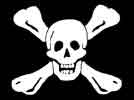|
Richard
Worley set out from New York with eight others in a small
open boat; they were ill equipped and carried few supplies.
The crew set out in late September 1718. Their ship was hardly
seaworthy so they set out down the coast and up the Delaware
River where they captured a boat laden with household goods
(this was not constituted as piracy, but rather burglary since
it did not take place upon the sea). The next prize taken
by these men was more in keeping with their needs, a sloop
out of Philadelphia. They took the sloop and increased the
size of their band to 12. Within a couple more days they had
taken another sloop that they felt more well kept than the
prior ship and transferred to it.
At this time the governor issued a proclamation
for the apprehension of all pirates who had not availed themselves
of the King's pardon, and ordered out the Phoenix, a ship
of 20 guns, to enforce this proclamation. However, Worley
and his band set out to sea and missed the Phoenix which was
searching for them in the coastal waters. Six weeks later
the pirates returned, having taken another sloop and a brigantine
among the Bahaman Islands. The company had increased to 25
during this trip and their sloop now mounted 6 guns. Captain
Worley and his crew had also adopted the skull and crossbones
in their ensign (flag). Articles were signed and the crew
were officially 'on account' that they would fight to the
end, no quarter asked or given.
They were next sighted off North
Carolina where they paused to clean and refit their ship.
The governor received this information and outfitted two ships
of 8 and 6 guns to trap the pirates, but to no avail as they
were gone by the time the ships arrived. Unfortunately, Worley
came in sight of the ships and mistaking them for merchants
moved to prevent them from entering the Jamestown harbor.
Instead of preventing their entry, he ended up trapping himself
in the harbor with two ships blocking his escape. True to
their articles the pirates fought to the end, taking a broadside
from one of the Carolina ships before being boarded. All of
the pirates died on board, except for the captain and one
other, who were very seriously wounded. Both captured pirates
were hanged the next day, February 17th 1719, for fear that
their wounds might prevent them from receiving the punishment
that was felt due.
|

